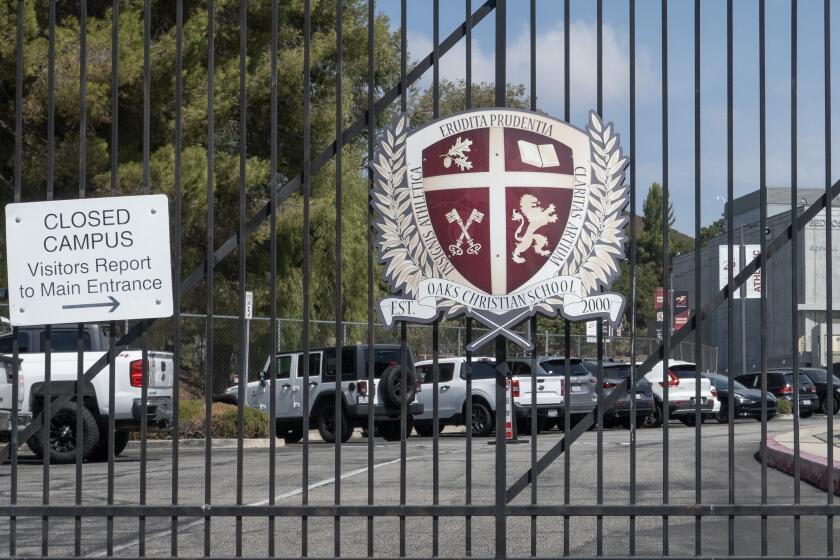High-Tech Plans for Hangar
The South Orange County Community College District is lining up to claim a piece of the former Tustin Marine base, with plans to turn a helicopter hangar into an ambitious digital learning center, with everything from a sound stage to a business incubator to the first dorms for any community college in Southern California.
It would even include a global hub for diagnosing cervical cancer from data relayed via the Internet.
Chancellor Cedric Sampson said the Digital Innovation Center for the Arts, Science and Technology--known as DI-CAST--is the most ambitious project the district has undertaken.
District officials hope the diverse tenants will bring students, professors and companies together, providing business spinoffs, training for an industry with a shortage of workers, and a place for companies to demonstrate software and hardware.
“It is a vision of convergence that almost doesn’t exist anywhere else,” said John Avakian, director of new media for the statewide community college system.
A four-year university undertaking a similar project would focus on research, but DI-CAST plans on a practical approach, teaching students in such high-tech areas as animation, laser optics and virtual reality. Many classes will be directed toward older students who need certification, training to advance in their jobs or to change professions. In other instances, the community colleges will contract to teach classes for companies.
Don Goodwin, a vice chancellor in charge of the project, said he expects most classes to be short, immersion-style offerings, perhaps taught in five-week cycles, mostly at night or on weekends.
“We think of Tustin as an applied technology park,” Sampson said. “It’s where we train people to apply the technologies that are developed. And we work actively with the local business communities to supply them with contract education and with training facilities that meet their immediate needs.”
Motorola is just one of the companies the district hopes to entice to the hangar. The telecommunications company hopes to establish its West Coast training office at DI-CAST, said Marly Bergerud, the district’s dean of business and vocational education. Students would be allowed to take the noncredit courses Motorola University offers its workers.
*
Steve Peterson, associate director of UCLA’s Center for Digital Innovation, applauded the project. “You need a work force that’s trained in multimedia development and new technologies much like you need a work force in any industry,” he said.
But an important question hangs over the proposal: When will the Navy turn over the land to the community college district? Last month, Bergerud said she expected the district to take control of its 98-acre slice of land Jan. 20. District officials insist the question is not whether they get the land, but when.
That might be an optimistic assessment. The Santa Ana Unified School District and the Rancho Santiago Community College District are threatening to sue for pieces of the nearly 1,700-acre base, which has two blimp hangars and four helicopter hangars.
If South Orange County doesn’t get the Marine land, officials at the district say they can find another spot for DI--CAST on the district’s two campuses, Saddleback and Irvine Valley, or at the former El Toro Marine Corps Air Station or the Irvine Spectrum. They would have to find another spot for the sound stage.
Land Title Needed Within 4 Months
If the district doesn’t receive title to the property within four months, DI-CAST will have to find temporary headquarters, said Robert Stewart, codirector of education, training and development for the project. To meet grant restrictions, the center will have to be ready for classes this fall.
The holdup over the Marine base has made some corporations reluctant to make commitments to DI-CAST, college officials said.
The community college district has received a $2-million state grant over two years for the project, the largest grant in district history, and it expects to receive another $1.5 million in federal money just for the incubator, which will provide students an opportunity to turn ideas into businesses.
The district began planning for the Tustin base several years ago. In September 1999, it hired Goodwin, who oversaw a similar conversion of Lowry Air Force Base near Denver into the Higher Education and Technology Center of the Community Colleges of Colorado.
“The potential here is much larger than what we did in Colorado,” he said, “because Orange County has so many more technology clusters we can take advantage of and that need work force support.”
The most ambitious project involves the San Juan Capistrano nonprofit group Medicine for Humanity, which would move into DI-CAST facilities and use the Internet to help fight cervical cancer in remote areas of the U.S. and the underdeveloped world. About a sixth of the gynecologic oncologists in the country work with the group.
Goodwin and Bergerud said Lucent Technologies tentatively had agreed to give Medicine for Humanity $6 million for training and DI-CAST $4 million worth of equipment for the telemedicine hub. But because Lucent stock has tumbled from $84 to about $13 a share in the last year, the company may pull back.
Dave Schriftgiesser, director of Lucent’s Next Generation Networks in Warren, N.J., said the college wants the company to decide on its commitment by the end of the year.
“The chances are good we will provide some help,” Schriftgiesser said. “We just don’t have any idea [how much] at this time.”
Medicine for Humanity has an annual budget of about $100,000 and already has sent medical teams to Mongolia, Nepal, the Philippines, Mexico, Malawi, South Africa, Uzbekistan, Poland and Croatia. Forty-four countries have asked for the group’s help. A multimillion dollar donation, said Dr. Robert Greenburg, the group’s cofounder, “takes us from begging for pennies and nickels and dimes to being a full-blown force in international health care. Orange County could be the focus of a whole new day in international medicine. We’ve got a big-time opportunity.”
The first program would take place in Thailand. Medicine for Humanity would send teams to teach doctors, nurses, traditional healers and midwives how to examine women and do biopsies of cervical lesions.
*
Under Medicine for Humanity’s program, a biopsy taken in Thailand would be scanned and digitized and sent over the Internet to the group’s hub in Orange Country for evaluation, and a group of volunteer physicians could gather online to decide on treatment.
Other applications include telepsychology, providing counseling over the Internet for cancer patients in developing countries and 24-hour consultations for doctors in remote areas.
“People do little bits and pieces of this, but we want bring it all together, and we think we have this wonderful opportunity at the Tustin hub to do that,” Greenburg said.
The college’s nursing students and faculty may be involved in the program, and Cal State Fullerton also has expressed interest.
The Research Triangle Institute in North Carolina, a joint project among Duke, the University of North Carolina and North Carolina State, also hopes to become involved with Medicine for Humanity, said Sam Field, director of the institute’s Center for Digital Systems Engineering. A 1,000-bed dormitory will be constructed, giving the campus five times more student housing than any community college in the state, and making it the only one in Southern California with a dorm.
A large portion of the hangar proposal is taken up with an 18,000-square-foot sound stage that would be used by students and commercial filmmakers who increasingly use digital techniques. Vern Vihlene, a Laguna Hills producer who will be director of the teleproduction sound stage lab, said Paramount, CBS and Disney have expressed interest in renting the facility.
Vihlene, who sits on the Orange County Film Commission, says students will use it most of the time, with commercial productions renting the sound stage every third week and hiring students to work for them.
(BEGIN TEXT OF INFOBOX / INFOGRAPHIC)
From Hangar to High-Tech Hub
A helicopter hangar at the former Tustin Marine Corps Air Station may become a 70,716-square foot “hub” for the arts, science and technology if a South Orange County Community College District plan is approved.
Source: Bastien and Associates
More to Read
Inside the business of entertainment
The Wide Shot brings you news, analysis and insights on everything from streaming wars to production — and what it all means for the future.
You may occasionally receive promotional content from the Los Angeles Times.











